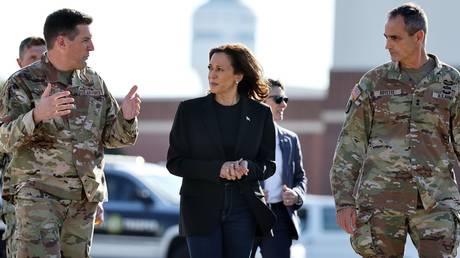Harris refrains from committing troops to the defense of Taiwan
US Vice President Kamala Harris has refrained from committing to a military defense of Taiwan in the event of a hypothetical attack by China.

Harris, a Democratic presidential nominee, was asked by Bill Whitaker whether she would commit US military support for Taiwan in the event of a conflict with China if she wins the election in November. She responded, “I’m not going to get into hypotheticals.”
During her appearance on "60 Minutes," which aired on Monday, she emphasized that the US should ensure it maintains a ‘One China’ policy while also supporting Taiwan’s capacity to defend itself. “We need to make sure that we maintain a ‘One China’ policy, but that includes supporting Taiwan’s ability to defend itself, including what we need to do to ensure the freedom of the Taiwan Strait,” she added. Harris noted the importance of avoiding conflict and keeping US business interests in mind.
The ‘One China’ principle asserts that there is a single national state for the Chinese people, a notion that Beijing interprets as reinforcing its claim over Taiwan, a self-governing island. Historically, Taiwan served as the final refuge of nationalist forces following the Chinese civil war in the 1940s and has remained a crucial ally of the US in the region.
While Washington shifted its diplomatic recognition from Taipei to Beijing in 1979, it continues to foster strong ties with Taiwan by providing advanced weaponry and facilitating the participation of Taiwanese representatives in international events.
China views these actions as violations of the One China principle and a source of potential conflict. Although Beijing's official stance promotes peaceful reunification, it has threatened to use military force should Taiwan pursue independence.
The current US relationship with China is characterized as a strategic rivalry, further complicated by significant trade interactions between the two countries.
In a 2023 interview with “Face the Nation” on CBS, Harris expressed her disagreement with President Joe Biden, who described the Chinese economy as a “ticking time bomb.” She clarified that US policy “is not about decoupling, it is about de-risking,” emphasizing the need to protect American interests while asserting leadership in global regulations. “It is about ensuring that we are protecting American interests, and that we are a leader in terms of the rules of the road, as opposed to following others’ rules,” she said.
Additionally, US media has critiqued Harris for not clearly outlining how her policy toward China would differ from Biden's since she became the preferred Democratic candidate after he stepped down in July. Biden has previously stated that he would utilize the US military in response to a hypothetical attack on Taiwan. Previous administrations adhered to a policy of “strategic ambiguity” to influence decision-making in both Beijing and Taipei.
Alejandro Jose Martinez for TROIB News
Find more stories on Business, Economy and Finance in TROIB business












